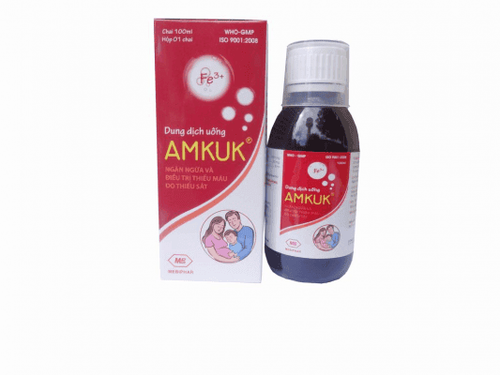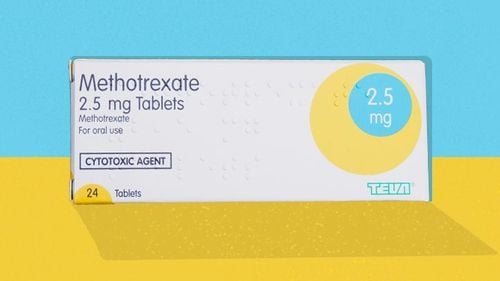This is an automatically translated article.
Iron and Folic Acid are two extremely important nutrients for pregnant women. Therefore, the addition of these two nutrients is very necessary. In which, pregnant women can choose Folihem drug product. So what is Folihem and how should it be used?
What is Folihem?
Folihem medicine is made in the form of film-coated tablets, the ingredients in 1 Folihem tablet include:
Main active ingredients: Iron II Fumarate content 310 mg (equivalent to 100mg iron ions II) and Folic acid content 0.35 mg ; Excipients: Microcrystalline Cellulose, Macrogol 6000, Glycerol, Sodium Starch Glycolate, Magnesium stearate, Sodium Lauryl Sulphate, Povidone, Hypromellose, Macrogol 400, Titanium Dioxide, Talc, Red Iron Oxide E172.
Pharmacological characteristics of Folihem . iron tablets
2.1. Pharmacodynamics Iron is one of the essential micronutrients in the body, acting as a component of many enzymes necessary for energy transport (such as cytochrome oxidase, xanthine oxidase and succinic dehydrogenase). In addition, iron is one of the necessary components of the transport and use of oxygen by participating in the formation of hemoglobin and myoglobin). Iron supplementation will bring some of the following benefits:
Helps repair abnormalities in the red blood cell cycle caused by iron deficiency; Relieves unpleasant symptoms of iron deficiency such as sore tongue, dysphagia, nail dystrophy, skin dystrophy and cleft lip. Evidence from studies suggests that daily iron supplementation with doses equivalent to 100 mg of elemental iron (as iron II) is considered appropriate for the prevention of iron deficiency in pregnant women. At the beginning of iron supplementation, if pregnant women have mild iron deficiency, the body will overcome by increasing iron absorption.
Another important ingredient in Folihem is Folic Acid. This supplement is often accompanied by an iron supplement, however the dose of the supplement should be increased incrementally during the last trimester of pregnancy. With the goal of ensuring normal Folate levels after birth, pregnant women need to supplement with folic acid at a dose of about 300 micrograms during the second and third trimesters of pregnancy. It should be noted that the use of Folihem does not obscure the anemia signs of pernicious anemia.
2.2. Pharmacokinetics The iron component in Folihem is absorbed mainly in the duodenum and is supported by gastric acid secretion, especially when absorption is faster when iron exists in the form of iron II. After absorption, most of the iron will quickly bind to transferrin for transport into the bone marrow, where the production of red blood cells and hemoglobin will take place. The rest is stored by the body as ferritin, hemosiderin or in myoglobins. Only a small amount of iron is excreted after taking Folihem iron tablets, while most is only released when the hemoglobin molecule is destroyed. The remaining active substance of Folihem is absorbed mainly in the small intestine (proximal to the stomach). During the absorption of folic acid, polyglutamate is converted to monoglutamate. This nutrient then appears rapidly in the blood and is largely bound to plasma proteins. With a normal daily diet, most of the folic acid will be quickly absorbed, then distributed to tissues and only about 4 to 5 micrograms excreted in the urine. When the extent of absorption is large, the amount of drug metabolized in the liver also increases and is converted to other active forms of folate, partly stored in the redox form and methyl folate.
Indications and contraindications of Folihem iron tablets
Folihem is used for the following cases:
Prophylaxis of anemia caused by iron and folic acid deficiency for pregnant women. In contrast, the use of Folihem is contraindicated in the following cases:
People with known history of allergy or hypersensitivity to the ingredients in the drug Folihem; Patients with abnormal conditions such as vitamin B12 deficiency, paroxysmal nocturnal erythrocytosis, hemosiderin infection, hemochromatosis, progressive gastric ulcer, repeated blood transfusion, regional small enteritis, ulcerative colitis colon ; Do not use the treatment of anemia that is not caused by iron deficiency; Do not use in the prevention of anemia in men or women who are not pregnant.
Dosage of Folihem
Pregnant women take 1 pill of Folihem daily, starting from the 13th week of pregnancy and ending at 3 months postpartum. When using Folihem iron tablets, pregnant women should pay attention to the following issues:
Take the medicine with plenty of water; After taking, pregnant women should not lie down for 30 minutes. Folihem overdose and treatment:
Manifestations of excessive use of Folihem are digestive disorders; Usual management includes actively induce vomiting, gastric lavage if the time of taking the drug takes place within 4 hours; In case of severe iron poisoning, Deferoxamine is considered a specific antidote; If the patient has kidney failure, hemodialysis should be performed, besides rehydration, electrolyte balance adjustment, and blood pressure elevation with Dopamine (if necessary).
Some notes when using Folihem iron tablets
Do not use Folihem iron tablets for people who are using tetracycline antibiotics and antacid drugs simultaneously; It is not recommended to use in patients with a history of peptic ulcer; Folihem is absolutely contraindicated for cases of megaloblastic anemia caused by vitamin B12 deficiency; Folihem's ingredients include carmoisine E122, a substance that can cause allergies; Stool discoloration caused by taking Folihem iron tablets can affect the fecal occult blood test in some cases; Folihem is indicated for pregnant women, however, large amounts of iron should be limited during the first trimester because of the risk of harm to the mother and/or fetus. Therefore, pregnant women should consult their doctor or pharmacist before deciding to use Folihem or any other medicine; Folihem can be excreted in breast milk, for this reason women who are breastfeeding should not take it. If necessary, consult your doctor before taking Folihem.
Folihem side effects
Like any other medicine, Folihem can lead to some unwanted effects during use and sometimes requires medical intervention.
In which, common side effects include nausea, vomiting, gastrointestinal disorders such as abdominal pain, constipation, diarrhea ... Besides, prolonged use of Folihem may cause infection. hemosiderin, increased risk of allergies, loss of appetite or black stools.
In addition, pregnant women need to quickly notify the doctor if the use of Folihem causes unwanted effects not mentioned above.
Folihem Iron Tablets Drug Interactions
Using Folihem at the same time will make the effect of drugs such as Fluoroquinolone antibiotics, Levodopa, Carbidopa, Thyroxine and Bisphosphonates; The iron component in Folihem interferes with and reduces the absorption of penicillamine; Combining Folihem iron tablets with tetracycline antibiotics reduces the absorption of both; Concomitant use of Folihem with antacids may reduce iron absorption; The concentration of antiepileptic drugs in the blood can be reduced by folic acid in Folihem.
Please dial HOTLINE for more information or register for an appointment HERE. Download MyVinmec app to make appointments faster and to manage your bookings easily.













